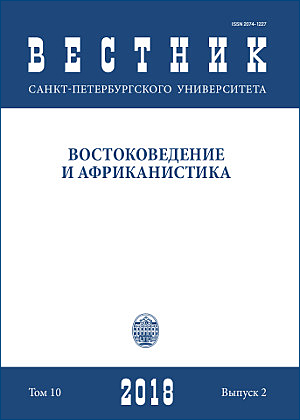Interpretations of Fyodor Dostoevsky’s “The Idiot” by Akira Kurosawa and Andrzej Wajda: A comparative analysis
DOI:
https://doi.org/10.21638/11701/spbu13.2018.202Abstract
Literary heritage of Fyodor Dostoevsky has always presented an attraction for world cinema encouraging and inspiring filmmakers from different countries including Asia to rethink and reinterpret the works of this outstanding Russian writer again and again. A remarkable effort toward “re-coding” of Dostoevsky’s narrative was made by Asian cinematography, namely by Akira Kurosawa, a Japanese film director and screenwriter. “The Idiot” directed by Kurosawa holds a special place among other adaptations of Dostoyevsky’s masterpiece primarily on account of this film exhibiting free and bold changes as regards the place and time of action. In Kurosawa’s interpretation events unfold in post-war Japan of the mid-20th century around Japanese characters brought together on a snowy island of Hokkaido. Placing the story in a Japanese frame and content Kurosawa makes the film not a mere illustration of Dostoevsky’s novel, but succeeds in accurately transmitting the spirit of the masterpiece. This significant Japanese film director and screenwriter reveals a deep understanding of the Russian world while remaining an informed transmitter or bearer of Asian culture. The way Kurosawa approaches Dostoevsky’s novel constitutes his subjective rethinking of this literary work observed through the lense of his homeland’s history and national tradition. Ancient Asian culture is clearly seen both in the storyline and visual imaging of the film. Like in his other films, in «The Idiot» Kurosawa introduces the Noh drama. This paper attempts to analyze Akira Kurosawa and Andrzej Wajda’s cinematic narratives, to identify characteristics of their artistic styles, and to reveal some specific features of adapting Russian classics in an Eastern cultural context.
Keywords:
Fyodor Dostoevsky, The Idiot, Akira Kurosawa, Nastasja, Andrzej Wajda, Noh Drama, Kabuki
Downloads
References
Downloads
Published
How to Cite
Issue
Section
License
Articles of "Vestnik of Saint Petersburg University. Asian and African Studies" are open access distributed under the terms of the License Agreement with Saint Petersburg State University, which permits to the authors unrestricted distribution and self-archiving free of charge.





